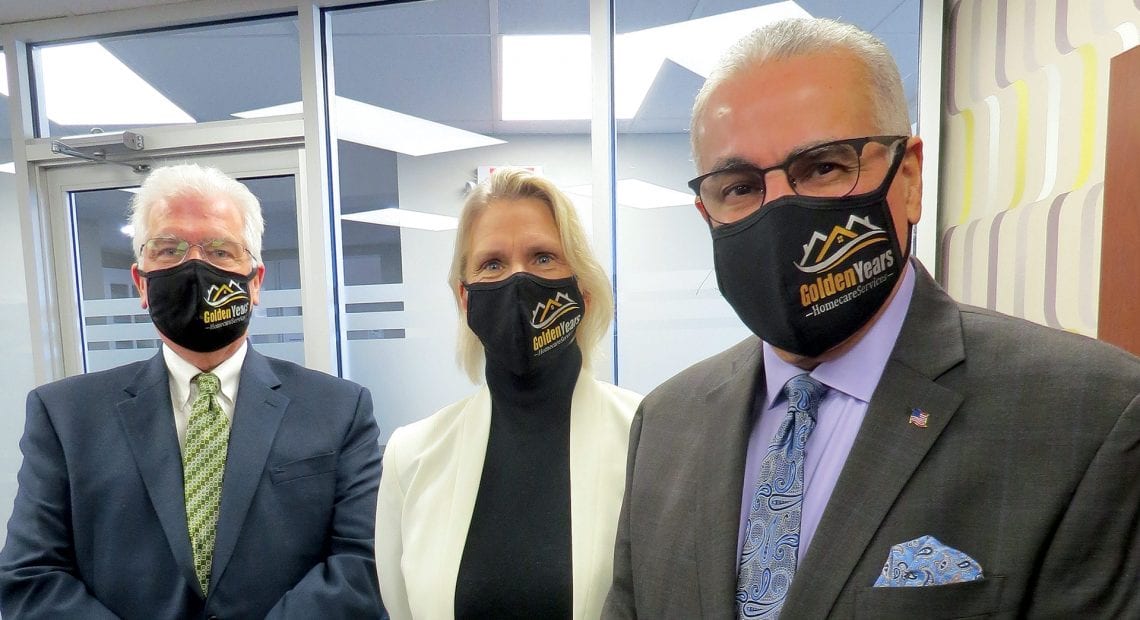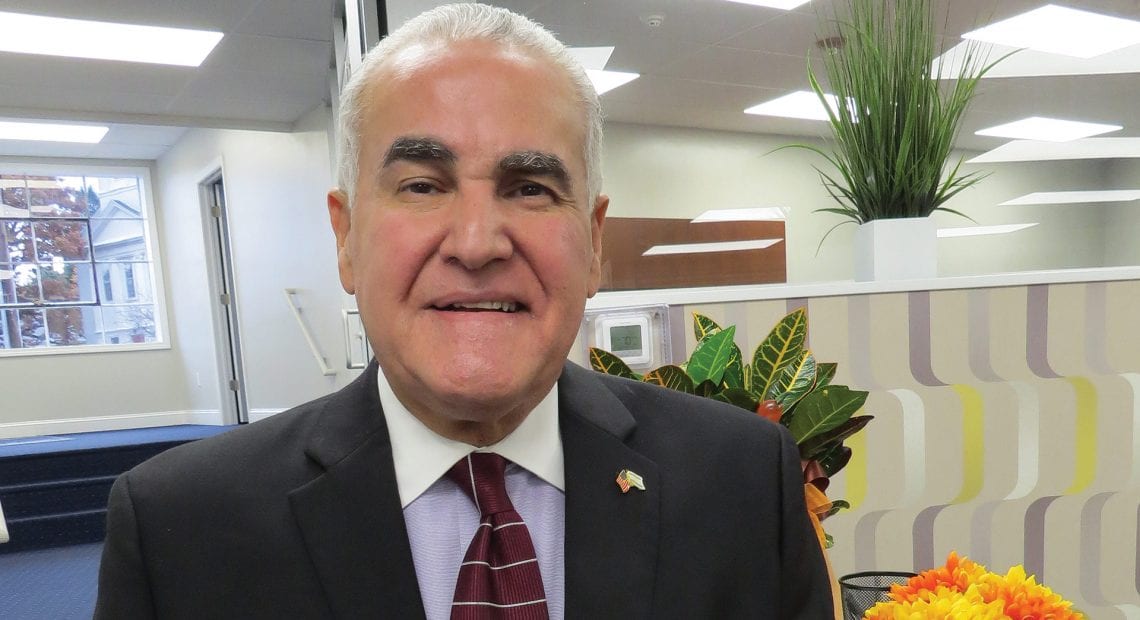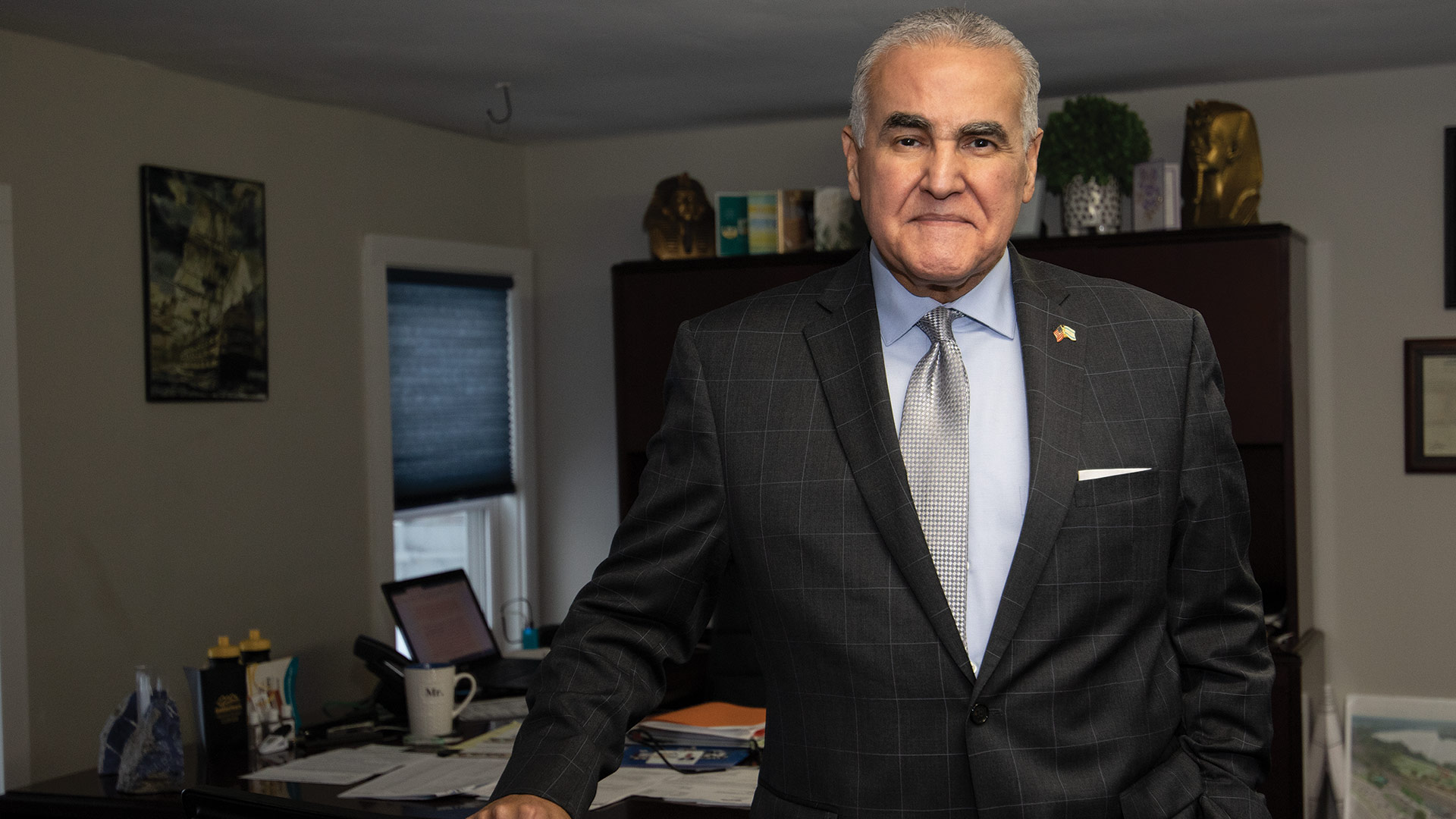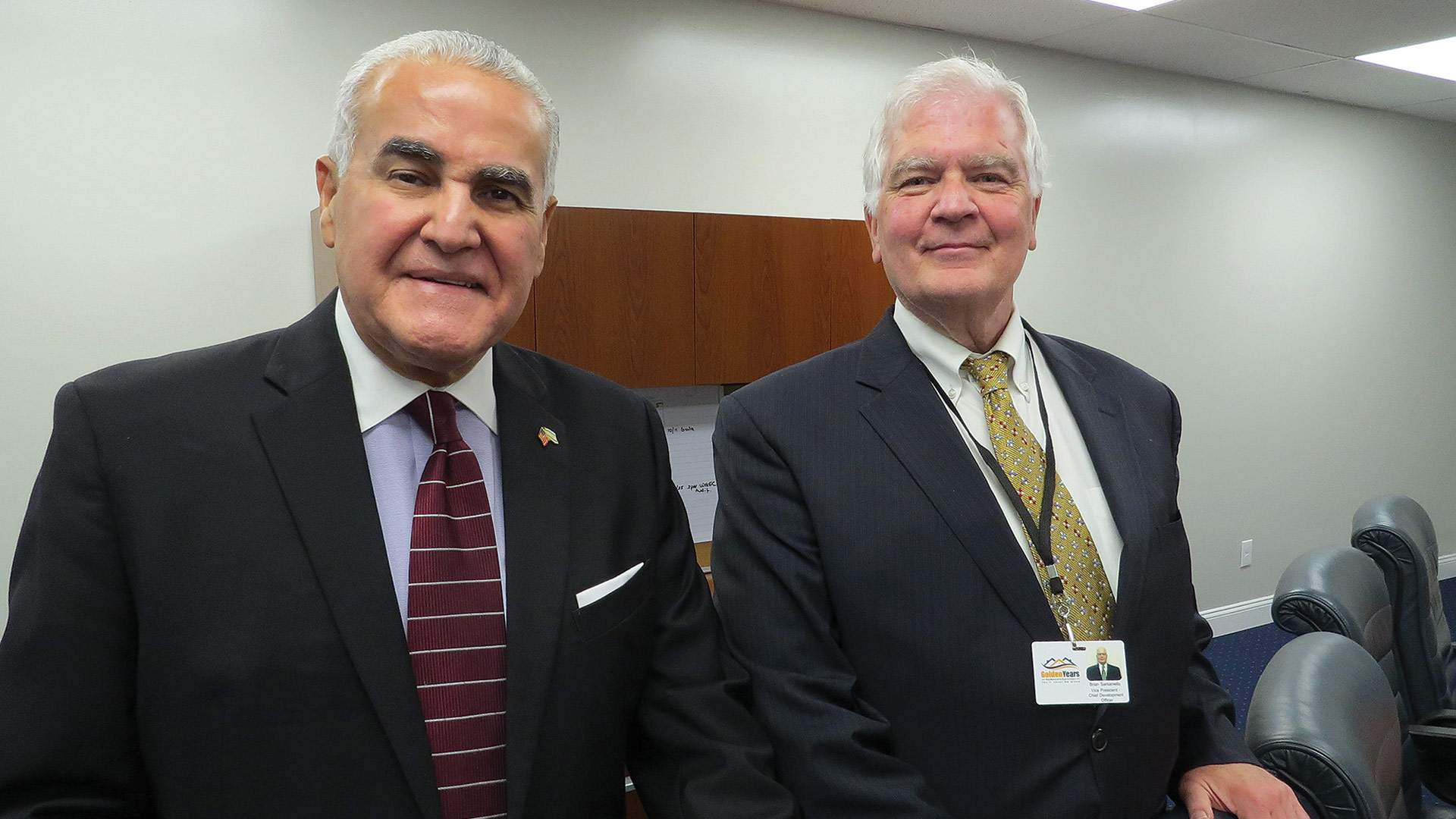Golden Opportunities Maintains a Torrid Pace of Growth, Diversification
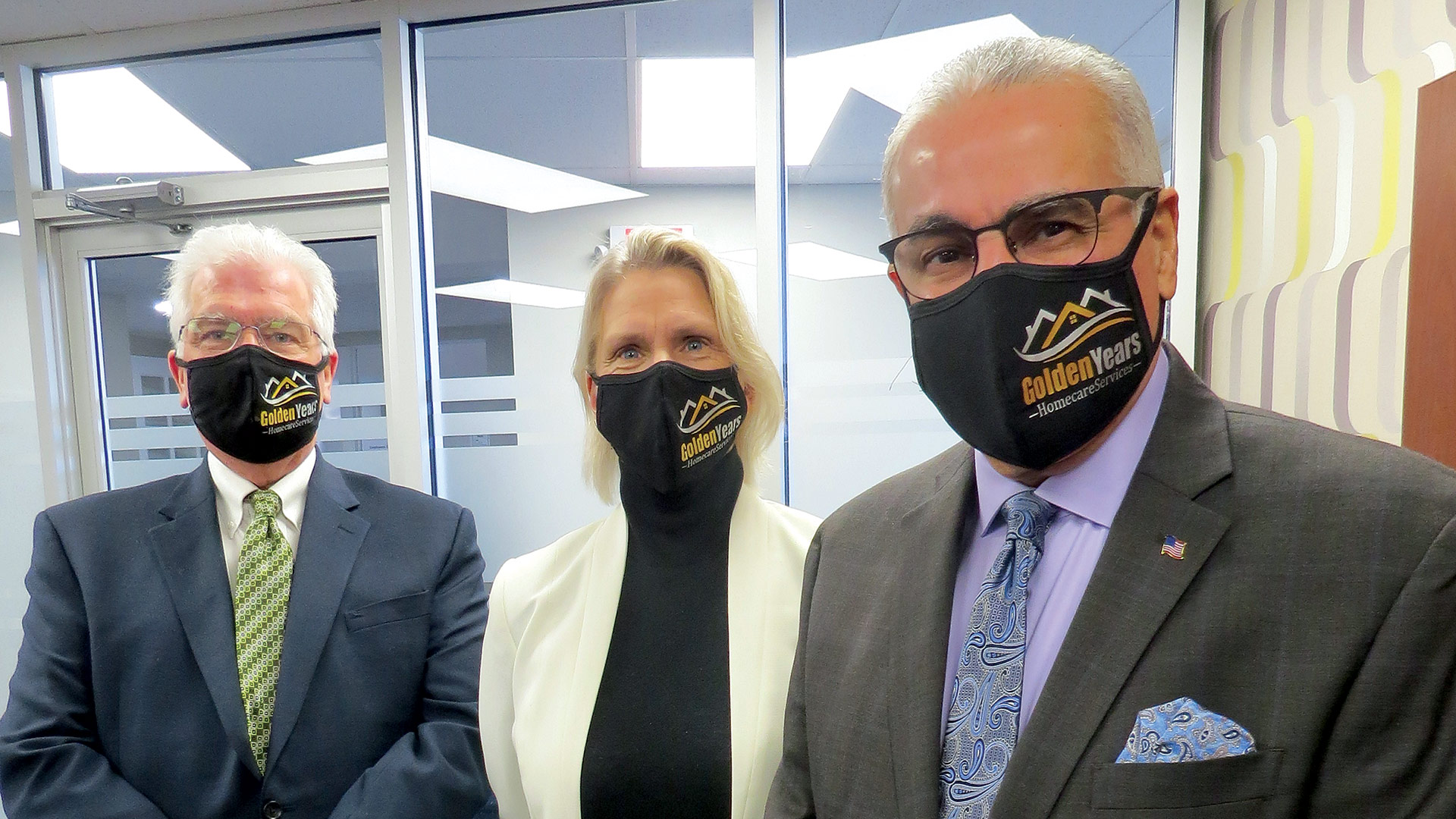
From left, Golden Years principals Brian Santaniello, Mary Flahive-Dickson, and Cesar Ruiz Jr.
Cesar Ruiz Jr. describes the business plan for Golden Years Homecare Services as “a living, breathing document.”
That intriguing phrase was chosen to convey many things all at once — especially movement, flexibility, seemingly constant change, and a certain ambitious tone.
Indeed, while every business plan is fluid and most are written in pencil — figuratively speaking, anyway — this one has been altered countless times since it was first drafted more than eight years ago, and the new lines on the page reflect why Ruiz, the company’s president, and the entire leadership team at this East Longmeadow-based venture have been named Top Entrepreneur for 2020 by BusinessWest.
Indeed, since being launched in 2016, this company, which started with home-care services, has expanded in every way imaginable. That includes its geographic footprint — it has moved well beyond its Greater Springfield roots and into Central Mass. and Northern Conn., with a new satellite office in downtown Boston set to open later this year. It also includes services; sensing opportunities, the company has expanded into behavioral health and will soon open a staffing component as well. And with a planned acquisition that Ruiz said is now “on the 2-yard line” — which means he can’t talk about it in any real detail, as much as he would like to — Golden Years will expand the portfolio to skilled care in the home.
There’s also been seemingly constant expansion of the facilities in East Longmeadow, with a buildout now in progress for the staffing and behavioral-health pieces of this ever-changing puzzle. And, looking ahead, plans are taking shape to franchise some of the services, expand into many more states, and perhaps take the company public to raise the capital to fuel all this expansion.
“The exciting thing is that we’ve only scratched the surface.”
Like an artist’s canvas, Golden Years is taking shape — and changing shape — quickly and dramatically, with those holding the brushes not exactly sure what the picture will look like when they’re done — or what ‘done’ will mean.
“We’re beginning our fifth year of operation, and it’s said that when you hit that fifth year, that’s when you really lay down that foundation,” said Ruiz. “We have grown by leaps and bounds in terms of our census, not only with our clients, but also with our caregivers; overall, we’re an organization that’s now managing more than 1,000 people, including administrative, caregiver staff, and clients.
“And the exciting thing,” he went on, “is that we’ve only scratched the surface.”
Not even a global pandemic has been able to slow this company down.

The sign on the property in East Longmeadow’s center announced the arrival of the Golden Years Behavioral Health Group, one of many indicators of growth at this company.
OK, it did slow it down a little. Last spring, as the virus invaded the region, some of the company’s home-care clients became understandably concerned about bringing people into the home and canceled or suspended services, and some caregivers decided they no longer wanted to be in that line of work, said Mary Flahive-Dickson, the company’s chief operating officer and a 30-year healthcare veteran, adding that the virus also slowed the pace of expansion into the Central Mass. market.
But, ultimately, opinions concerning homecare during this pandemic changed, she said, adding that many came to view that option as being far more attractive than a nursing home or other types of long-term-care facility, places that saw outbreaks of the pandemic and, in some cases, large numbers of deaths.
This change in attitude is reflected in the growing numbers of clients in the Greater Springfield area, she said, adding that the census is now approaching and perhaps over the 500 mark, representing roughly 20% growth over the past year — again, in the middle of a pandemic.
“Having been in home care for more than two decades, and in healthcare for more than three, the home is far less of a risk, with the pandemic protocols that are going on now, than a facility,” she said, adding there is growing sentiment within the healthcare profession that this trend, or movement, if it can be called either, could have a degree of permanence, especially at a time when some are warning that COVID-19 will certainly not be the last deadly virus to threaten the world’s population.
Meanwhile, the pandemic and its impact on the overall mental health of area residents certainly played a role in propelling the company into the behavioral-health realm, said Ruiz.
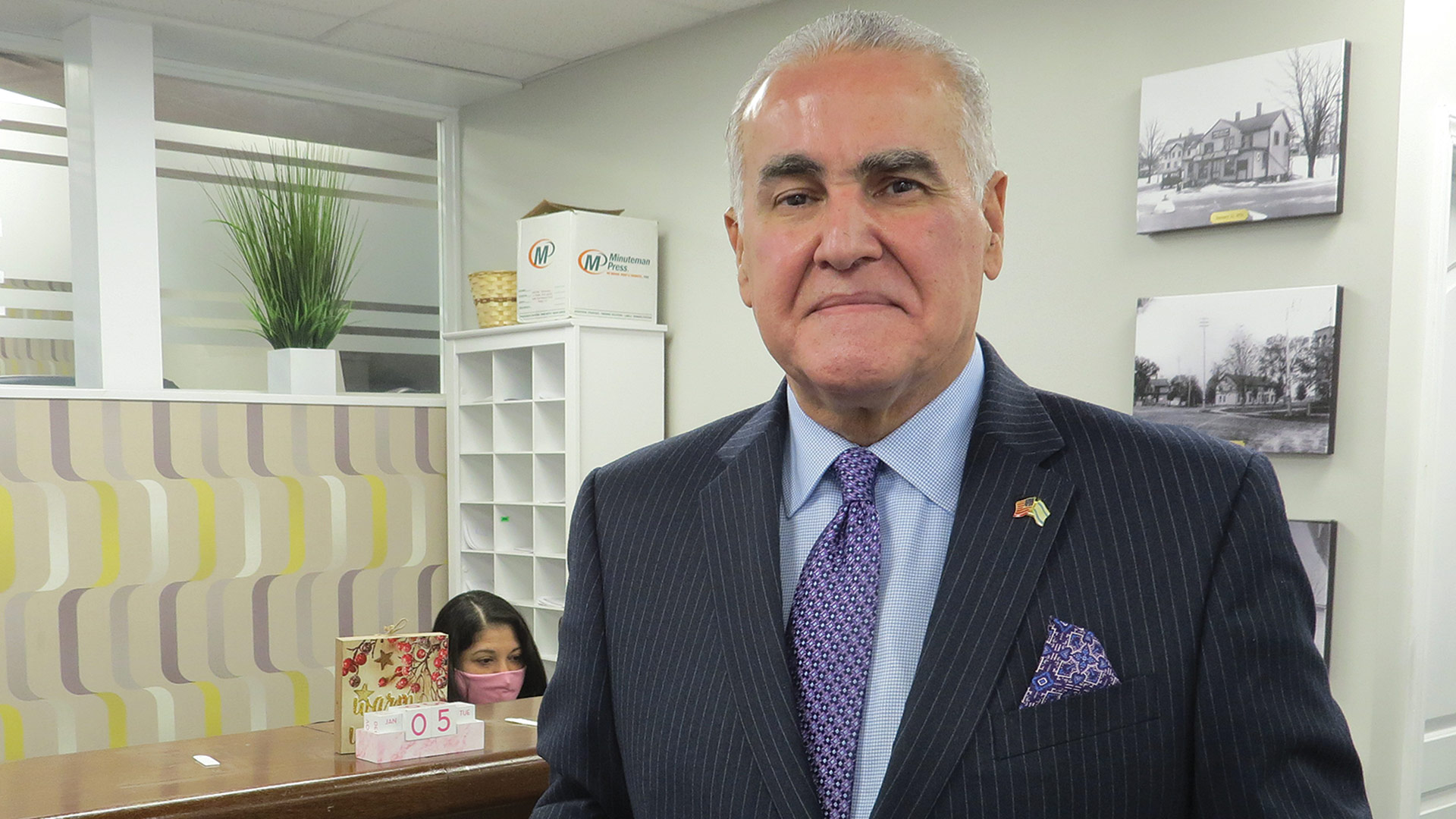
Cesar Ruiz Jr. projects that Golden Years could again double in size over the next five years as the venture expands into new markets and new service areas.
That division of the company, if you will, was launched roughly a year ago, but the pandemic has certainly elevated the level of need and validated the decision to again rewrite that business plan and move into this field.
“Even though there’s a lot of agencies in the behavioral-health realm, we still felt there was an opportunity for us,” said Ruiz, noting that this division provides an array of services, including alcohol- and drug-addiction services and counseling to frontline workers such as police and firefighters.
For this issue, BusinessWest talked with the principals of Golden Years about how far this company has come in five short years, and just what Ruiz meant when he said they had barely scratched the surface.
Shining Examples
“We don’t look at ourselves as competitors — that’s a word that we don’t use here. We’re creators — we create our niche. And we do that by telling our story and emphasizing our services.”
That’s what Ruiz told BusinessWest when we talked with him roughly 14 months ago. That was his answer to a question concerning the home-care market in the Greater Boston region (and this one, as well), the many players already on that field, if you will, and his thoughts on why he thought there was room for one more.
His reply speaks to the confident operating tone at this venture, and offers, all by itself, some insight into why the company’s principals have been chosen for the prestigious Top Entrepreneur award, launched in 1996, and join an elite group of honorees (see chart, page 19) that includes college and hospital presidents, tech-startup founders, and many others.
“Over dinner, we realized that we had the same thoughts of creating a company that would satisfy a recognized need. We thought we could do better; we knew we could do better.”
Indeed, at Golden Years, they do look for niches, they really enjoy telling their story (we’ll get to it in a minute), and they put the emphasis on services. And, as Ruiz said, they don’t view themselves as merely another competitor in whatever field they happen to be entering, but as creators … of opportunities and, yes, niches.
That was true in homecare and in staffing, and it’s also true in behavioral healthcare, as Tracy Mineo, executive vice president of Golden Years Behavioral Health Services, explained when she was asked essentially the same question Ruiz was asked — about the playing field and why Golden Years saw opportunity within it.
“There are a lot of fine agencies operating in this region,” she said, noting that she worked for many years at one of them — Behavioral Health Network. “But even the bigger agencies … there is only so much that they can handle, especially during this time of COVID, when people are isolating; the agencies can only take on so many clients.
“So I think there’s more than enough room for these services,” she went on, adding, again, in the same fashion that Ruiz and others talk about the home-care side, that it is not merely about which services are being provided, but how.
And this brings us back to the Golden Years story. There are several, but this one is about Ruiz and his grandmother, who became the real inspiration for this venture. She needed home care in Florida more than 15 years ago, and Ruiz recalled for BusinessWest not only how poor that care was (he said family members generally provided the care for her), but also his resolve to create something much better.
That something better would eventually become Golden Years. That’s eventually. The timing and the setting were not exactly right for a new venture back then, he recalled, adding quickly that, after he relocated to this region, and especially after his father died in late 2016, he picked up the dream where he had left off.
Partnering with Lisa and Vincent Santaniello, who had similar experiences with caring for loved ones in the home, he launched Golden Years in early 2017.
“Over dinner, we realized that we had the same thoughts of creating a company that would satisfy a recognized need,” he explained. “We thought we could do better; we knew we could do better.”
Lisa Santaniello, executive vice president of Golden Years Homecare Services, agreed, noting that, from her first-hand knowledge, she understands the importance of home-care services to those suffering from a chronic condition, a devastating injury, a debilitating illness, or even loneliness, and that such individuals would certainly benefit from companion services.
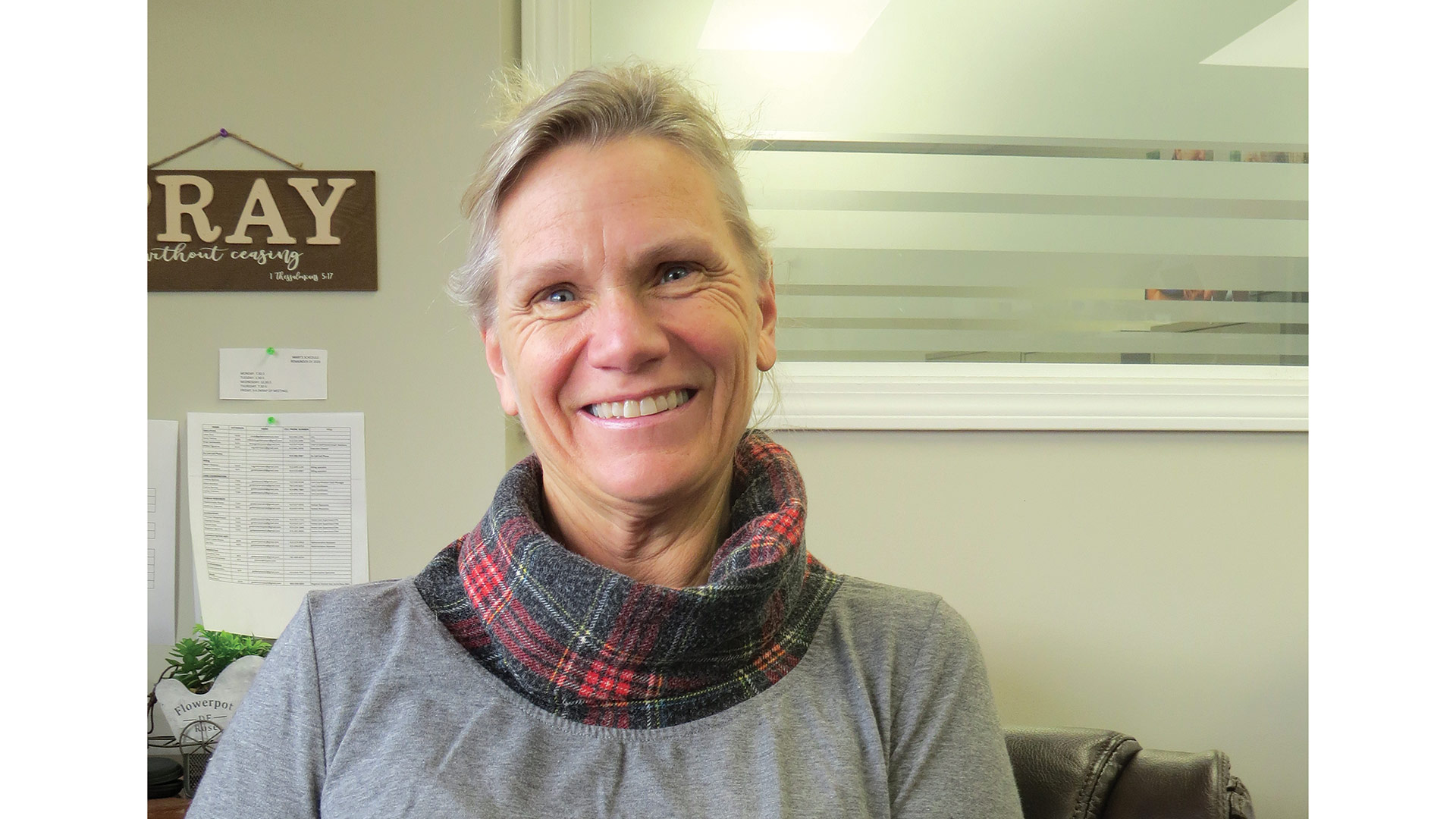
Mary Flahive-Dickson says the pandemic initially forced many to cancel or suspend home-care services. But as time went on, many came to see the home as a safer alternative to nursing homes and other facilities.
“When chronic care is needed or a medical crisis occurs, I am very aware the entire extended family is affected along with the patient,” she told BusinessWest. “Lives are turned upside-down; schedules are disrupted. Sometimes, needed care is short-term; the patient will recover, and normalcy will be restored. Other times, health conditions are far more long-lasting, and improvement does not occur.
“My own mother suffered from a debilitating and chronic disease. She had the benefit of a large, extended family who could assist in coordinating care and provide the services she needed,” Santaniello went on. “Many people aren’t that fortunate; that’s where Golden Years comes in. We provide necessary home-care services to the patient, while also providing respite for their weary caretakers.”
Business was slow to start — Ruiz recalls that it was weeks after opening before the phone really started ringing — but it picked up quickly.
Flahive-Dickson, a long-time healthcare consultant and educator focusing on healthcare management, joined the company in 2019 to essentially take the home-care component to the next stage — or stages. These include expansion within this market and also into other regions, starting with Central Mass. She said her role has evolved over time and now includes elements of operations, development, and strategic planning.
Her comments about why she joined the venture speak volumes about the ambitious mindset that prevails and the entrepreneurial nature of the company.
“I saw a wonderful vision and a throwback to the way care was provided,” she explained. “My dad was a physician in the Springfield area, and his care was real and positive and forward-thinking care, and I felt that same feeling when I first came here.”
Showing Their Metal
While the home-care operation has become a regional success story, to be sure, there have been some growing pains, and the pandemic certainly created a number of challenges.
As for the growing pains, they involve everything from finding adequate numbers of caregivers — a challenge for every player in this business — to breaking into established markets with large numbers of competitors, like Worcester and Boston, and, to a lesser extent, Northern Connecticut.
Finding adequate numbers of caregivers has been a constant challenge, said all those we spoke with, but an array of factors, from what had been historically low unemployment rates to the pandemic-induced anxiety about going into others’ homes, to the company’s torrid pace of growth, has only exacerbated the problem.
And the company has responded in what can only be called an entrepreneurial way, with creation of its own education program and a collaborative initiative with the city of Springfield to help train young, homeless individuals and bring them into this profession.
Meanwhile, the pandemic has created more hurdles, said Ruiz, listing everything from those initial fears about bringing people into the home — he estimates that between 60 and 80 clients suspended service for some period of time last spring — to what to do with caregivers sidelined by those suspensions of services (they kept them on the payroll); from the need to secure PPE for staff and train them in how to use it, to paying what became exorbitantly high prices for that PPE.
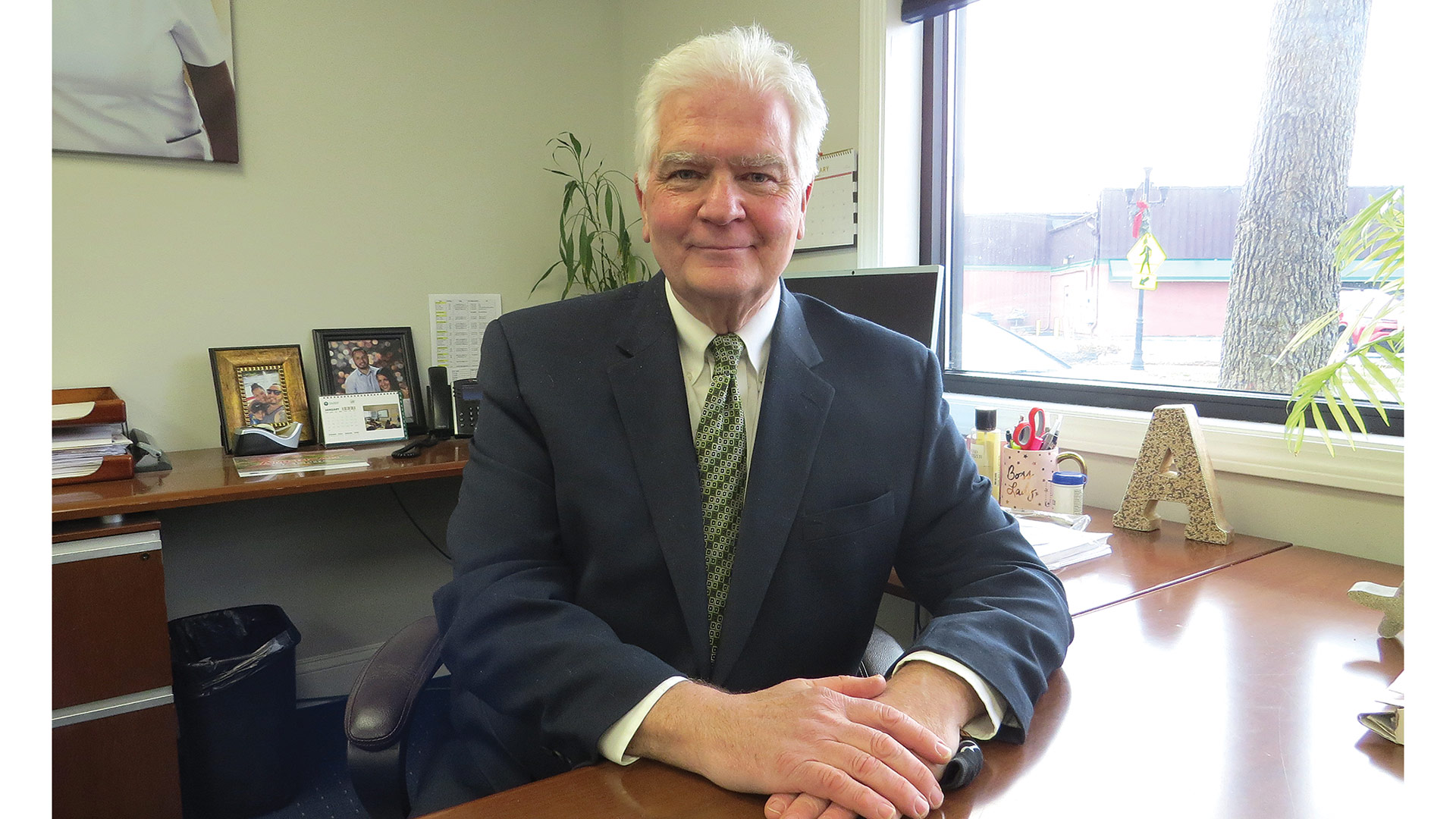
Brian Santaniello, chief of staff at Golden Years, says the pandemic, and its broad, negative impact on mental health, validated the company’s expansion into behavioral-health services.
“We were experiencing the same problem everyone else was encountering — where to buy it,” he recalled. “And if we could find it … it was a terrible experience; things that we were paying 30 cents for were now costing us $1.25 or $1.50. The N-95s that were costing us 95 cents or a dollar … we were now paying $4.50 to $6 per mask.”
Flahive-Dickson agreed, and said procuring the needed supplies became a “24-hour mission” that involved all those at the company. But elements of that experience were rewarding, and even uplifting, she went on, citing volunteer efforts to not only make masks for some of the home-care providers, but also donate supplies to other institutions that were having issues, as well as gift bags to seniors and veterans.
But despite the pandemic, and in some ways because of it, the company has been able to maintain its strong pace of growth.
As Flahive-Dickson noted, attitudes about bringing people into the home — at least when viewed through the lens of a nursing home or similar facility being the most logical alternative — have certainly changed.
“We were getting calls all the time — the phone was ringing off the hook,” she said. “People were taking their loved ones out of facilities and saying, ‘now I need help.’
“There are many reasons why the home is now a safer haven than a facility, with the most obvious being that, if you’re having someone being taken care in the home, you have less than a handful of people taking care of that person,” she went on. “It’s the same person or the same team, and they are fully equipped with PPE. And they see only that one person, rather than going from room to room to room.”
These changing perceptions, along with a contract with the Commonwealth Care Alliance, one if its largest providers, and a growing relationship with the Veterans Administration, should help the company as it now moves forward with its expansion into Central Mass. — it now has a small number of clients in the Worcester area and a satellite office in Marlboro — and also into Boston, with another satellite office to open soon on Cambridge Street, said Brian Santaniello, the company’s chief of staff and a stakeholder.
“One of our primary goals for 2021 is to expand in those markets,” he said, adding that the company has a toehold in Worcester and Northern Connecticut, and is still in the infancy stages of its push into Boston, but expects the market share to grow steadily in all three regions over the next few years.
Forward Thinking
Moving forward, Golden Years is advancing plans to provide home care in multiple states, and that’s just one component of a larger expansion strategy.
Indeed, Ruiz and his team are preparing to unveil a staffing component, and it has already launched its behavioral-health division, one that was, as noted, partly inspired by the pandemic and the dramatically rising need for behavioral- and mental-health services, and likewise driven by recognized need for such services among the home-care clientele.
Indeed, Ruiz estimated that at least 15% to 20% of the company’s 500 clients are receiving some type of counseling service. With their entrepreneurial mindset, the company’s leaders began asking the question, ‘are these services that we can and should provide ourselves?’
The answer that came back was a resounding ‘yes,’ he went on. “We didn’t want to leave anything on the table; this was an opportunity for us to provide these kinds of services to our existing clients.”
Previous Top Entrepreneurs
• 2019: Cinda Jones, president of W.D. Cowls Inc.
• 2018: Antonacci Family, owners of USA Hauling, GreatHorse, and Sonny’s Place
• 2017: Owners and managers of the Springfield Thunderbirds
• 2016: Paul Kozub, founder and president of V-One Vodka
• 2015: The D’Amour Family, founders of Big Y
• 2014: Delcie Bean, president of Paragus Strategic IT
• 2013: Tim Van Epps, president and CEO of Sandri LLC
• 2012: Rick Crews and Jim Brennan, franchisees of Doctors Express
• 2011: Heriberto Flores, director of the New England Farm Workers’ Council and Partners for Community
• 2010: Bob Bolduc, founder and CEO of Pride
• 2009: Holyoke Gas & Electric
• 2008: Arlene Kelly and Kim Sanborn, founders of Human Resource Solutions and Convergent Solutions Inc.
• 2007: John Maybury, president of Maybury Material Handling
• 2006: Rocco, Jim, and Jayson Falcone, principals of Rocky’s Hardware Stores and Falcone Retail Properties
• 2005: James (Jeb) Balise, president of Balise Motor Sales
• 2004: Craig Melin, then-president and CEO of Cooley Dickinson Hospital
• 2003: Tony Dolphin, president of Springboard Technologies
• 2002: Timm Tobin, then-president of Tobin Systems Inc.
• 2001: Dan Kelley, then-president of Equal Access Partners
• 2000: Jim Ross, Doug Brown, and Richard DiGeronimo, then-principals of Concourse Communications
• 1999: Andrew Scibelli, then-president of Springfield Technical Community College
• 1998: Eric Suher, president of E.S. Sports
• 1997: Peter Rosskothen and Larry Perreault, then-co-owners of the Log Cabin Banquet and Meeting House
• 1996: David Epstein, president and co-founder of JavaNet and the JavaNet Café
Santaniello agreed. “This pandemic is having a tremendous negative impact on mental health and drug addiction, and we see the need,” he said. “And we’re going to meet that need.”
The company hired Mineo and also Deborah Rodrigues, now the clinical director, and gave them equity stakes in the venture.
Mineo, as noted earlier, said there is clearly unmet need in the region that this new division will meet. And the division is starting with outpatient services, including addiction, mental-health, and behavioral-health services for those 18 and over, with priority populations being seniors, pregnant and postpartum women, IV drug users, and first responders, a constituency that has been traditionally been underserved, in her view.
“We had identified that there are so many services going on in the community, including our local police departments, but no one is really providing services for our first responders,” she explained. “This includes the police officers, the EMTs, the fire departments that are right on the front line.
“With this pandemic, the civil unrest that’s going on, and everything else … all this is traumatizing and retraumatizing people on a daily basis,” she went on. “This is an unmet need in the community.”
As for that acquisition that was on the 2-yard line and that the team couldn’t talk much about, Flahive-Dickson, who likened it to a VNA, said it will broaden the client portfolio by 150 or so, add to the staff, obviously, and broaden the roster of services provided in the home.
“It’s home healthcare, not home care,” she explained, adding that this will be an important addition to the portfolio, one that provides both synergies and growth opportunities.
Looking further out, Ruiz, when asked where he expects this company to be in five years, said he expects to continue the current pace and effectively double in size. He also expects to be in many more states and possibly have franchises of the Golden Years operation — or operations, to be more exact.
That expansion will come in a number of forms, he went on, listing both organic growth and additional acquisitions, with the latter becoming more feasible, and practical, as many smaller ventures, many of them operated by Baby Boomers approaching retirement, face succession issues and other challenges.
“On the home-care front, some of the individuals that have started now want to step back,” he explained. “And because of our vision, we have a larger appetite.”
Meanwhile, Ruiz and other company leaders are in the exploratory phases of perhaps franchising the concept and even going public, to provide the capital for such steps.
“Franchising is part of our thought process; it’s part of our business plan,” he noted. “And there’s also a public initiative. Those conversations have been ongoing, and now, in 2021, they will escalate, because those things take time to structure.”
Elaborating, he said the company has hired a CPA firm and a legal team with those plans in mind and with the goal of being ready when the time and opportunity are right to move quickly and decisively.
And, in many important ways, that has been the MO from the very start.
Good as Gold
When asked to sum up what has enabled Golden Years to get off to such a fast and dramatic start, Ruiz said it comes down to two words: culture and teamwork.
The culture rests in an attitude Ruiz has instilled, one where he treats each client as if the individual was his mother or father — a culture that has resonated with Flahive-Dickson, Mineo, and others who have joined the company.
“We’ve communicated that throughout the system — we’ve built it in,” he explained. “And I think that makes a big difference. We’re hands-on, and every caregiver knows, every admin, every director here knows, how passionate I am and how serious I am; this is the collaboration of a team.”
It’s also the byproduct of an ambitious, ever-changing business plan, one that really is a living, breathing document.
George O’Brien can be reached at [email protected]



